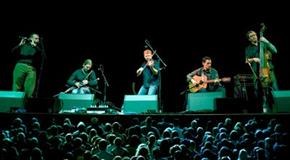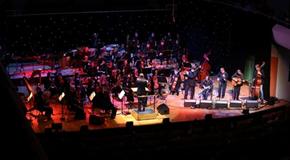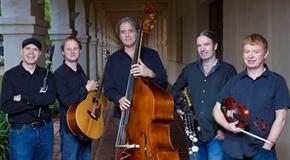Features
Lúnasa’s Irish Music Mission
We wouldn’t blame you for thinking that members of a band playing traditional Irish music would all live in Ireland. Although most of the musicians in Lúnasa do live on the Emerald Isle, Vallely’s marriage to an American resulted in him relocating to New York City 10 years ago.
Giving Pollstar a peak behind the proverbial curtain, Vallely described how the band sizes up a venue’s acoustics, their future TV plans and why recording with the RTÉ Concert Orchestra was different when compared to their recording sessions for past albums.
While Lúnasa With The RTÉ Concert Orchestra doesn’t drop until April 16 on Lúnasa Records via City Hall Distributors (in the U.S.), a digital download will be available in time for St. Patrick’s Day.

The new album features Lúnasa playing with the RTÉ Concert Orchestra. How did that come about?
The link between Lúnasa and the orchestra was actually through my brother Niall [who] is more of a traditional musician and arranger. He had done quite a few projects with classical groups in the last five or six years. He was doing a project with RTÉ and they asked him to come up with another project, and he suggested he would arrange music for Lúnasa and the orchestra.
So it all came about a year ago. It actually happened quite fast. We did a big concert in Dublin in June, went into the studio in October and put the album out. It was mostly pieces we had done before, sort of a “Best Of” combined with pieces Niall felt would work best with the orchestra. There’s only one new track that we hadn’t recorded. He kind of changed the arrangements a bit, the intros, bridge passages and stuff, to maximize the use of the orchestra.
Was the initial idea just to perform the concert with the orchestra, or was making the album always part of the plan?
A studio album was always part of the plan. RTÉ, which is the national broadcaster, has two orchestras. They have a symphony orchestra and a concert orchestra. … What they [concert orchestra] do is collaborations with different groups and different genres. Irish music would be a rare one, but they play with rock/pop artists. … They’re always recording these projects.
For the live performance with the orchestra, does a conductor lead the band as well as the orchestra?
I suppose it depended on the piece, but he generally conducts the orchestra. The arrangements are set out so that they’re mostly extensions of the existing band arrangements in terms of harmony and the rhythms. The arrangements were set out very much in line with what we would be doing anyway. Sometimes there’s a counting when we all start together or sometimes the orchestra starts and he would conduct, count us in. … He [David Brophy] was a fantastic conductor, he was great at melding the two things together. I think we were very lucky to have him in charge of the project. He totally understood where we were coming from. He wasn’t too rigid about how things were. He knew there was sort of an ebb and flow with Irish music that he didn’t want to get in the way of. We were lucky to have him right from the start.
Did Lúnasa record its tracks separately from the orchestra, or did the band and orchestra perform together?
It was done live. There was very little time, to be honest, compared to how we normally record our albums over a period of weeks. This was done in two short sessions over two days. It was essentially two or three goes, maybe one rehearsal run. It wasn’t all the same people that did the live gig. We generally had a run-through … whatever happened, happened. It was different in other albums. There was no overdubbing or adding parts.
From a musician’s viewpoint, was this easier than recording other Lúnasa albums?
It was a lot of pressure, time-wise. But I think there was a great aspect to that because you played knowing this is what was going to be on the record. Recording albums, you often feel that you can always do it again. The good side is if something does go wrong you can do it again, you can even do your own part again. Even if the rest of the band gets it, you can go back and overdub your part. I think, when you can’t do that, it forces you to play much better. You just know you can’t mess this up. I think everybody rose to the occasion because of that.
For two days, it was a lot of pressure. All the records we’ve done, we’ve spent weeks, even months agonizing over multiple takes and redoing stuff. I’m not sure that the result ends up any better, anyway.
Is everyone in the band very meticulous about how any particular album is progressing, or is there one person who is constantly nitpicking?
Let’s just say some are more nitpickers than others [laughs]. It’s a good thing. … Some people are very neurotic about every note being right. It’s very good to have that kind of conflict … in the band that keeps it somewhere in the middle, of not going too much either way.

What’s a common misconception Americans may have about bands playing traditional Irish music?
The circuits we play, we’re playing, most of the time, to fans of the band because we’ve been playing here 14-15 years. It’s hard to put me in the position [to imagine] what might be the misconception. Hopefully the music is fresh and not something that’s regurgitated. Every single band that’s on the circuit like us has their own sound and tries to take a fresh approach to the music. It’s a common music that we all play but we’re all living for our own angle on the music – writing our own pieces or adding pieces or arranging the music differently than what anybody [has done] before us. I suppose you would hope the audience might recognize that you’re doing something new or innovative with the music.
The band’s upcoming performance in Philadelphia this spring will be filmed for the “On Canvas” program on local PBS affiliate WHYY. Is the band planning on doing more television in the future?
Yes, we definitely are. I think it’s something we’ve neglected and not pushed. We probably came just after the era of everybody doing a live DVD as a sellable project. I think it’s as if now people are only doing television shows or promo videos . Most of the footage we have is from Irish television or Scottish television. The good thing was that for the orchestra live concert, we filmed that and we’re going to be putting footage of that out, not to sell, but as a video on the website, YouTube and stuff. That will help a lot for people to understand where we’re coming from. It’s one thing hearing it, but seeing it makes it a big impact, when people see instruments like the pipes, whistle and fiddle and how we actually play. The live performance, obviously, is the best way to gauge the band sounds, how the music works live.
Although Lúnasa is an acoustic band, you’re not totally unplugged in the sense that some instruments do employ electric pickups.
Yeah. Like the guitar and the bass have direct inputs. They usually have a microphone as well. It’s easier to get the sound out through a direct box as well as the microphone. It’s an acoustic show, but because we have bass and guitar, it’s a pretty lively sound. I think people that aren’t used to Irish music sort of would identify with that end of things, chord progressions, the sounds of guitar and bass. For those who find the pipes very alien, they might get something out of that.
Are there obstacles or hindrances that are unique to an acoustic act?
Generally, the big hindrance is getting the sound out there but we solved that by getting our own sound engineer. We’ve tried in the past, and I’ve tried with many other groups, to just arrive at a venue with pipes, whistle and flute. Somebody who doesn’t know how the music should sound, that can be very difficult, mostly impossible for them. They’re used to a vocal, guitar, bass, maybe percussion, and they know how to mix that. But I’m not sure most engineers truly understand how the sound should come out with the guitar and bass or the rhythm side of things and that the melody is the pipes and fiddle, etc., taking the place of the vocal. That’s always been a problem. Even getting volume out of pipes can result in terrible feedback. That’s always been difficult but we’ve solved that by bringing a sound engineer [Richard Ford, engineer on Lúnasa With The RTÉ Concert Orchestra]. He’s an invaluable part of our sound and touring plans.
When touring, do you and your bandmates immediately size up the room upon arrival?
Yes, I suppose. On our tours of the U.S., we tour for, say, 30 days in a row, Friday nights in big performing arts center, mid-week in a medium-size theatre and on Monday night we’re playing in a small club like a standard venue or place where people are drinking. A lot of them, we know the venues from touring for so long, but it certainly impacts the show a lot. Our sound engineer, especially, when he walks through the door, he either groans or smiles at what he’s faced with. But we leave it all in his hands. He recognizes all the sound systems, acoustics and stuff.
It can be a problem. It’s funny, even within the band, in some of the big halls, they’re good for the melody instruments like the pipes and flute but not so good for the bass. Whereas in a club, if it’s a noisier venue, that really suits the bass and guitar and it’s harder to make the pipes work in that kind of venue.
Do you have a favorite kind of venue to play?
Maybe I’m sitting on the fence, but I do enjoy the variety. Sometimes when you’re in a big theatre, there can be less atmosphere than in a club. Sometimes when you’re in a club, there can be a great buzz and a great atmosphere but you’re thinking you can’t hear yourself. Probably what works best are some of those theatres where people are a bit livelier and really go for it because you get the combination of good acoustics and feedback from the audience. And that can be certain parts of the country, certain age groups of the audience. The familiarity of the band factors into how responsive the audience is. A good audience make a band sound great, vice versa.
When performing live, are you hearing what the audience hears?
I think you would hear it quite differently. Monitor sound tends to be very different than house sound. The P.A. is always set up for the audience, going out as nice as possible. Again, to go back to bringing your sound engineer almost as your sixth man in the band, we always know, even if the monitors sound terrible, that he’s doing the right thing out front. He can persevere through a bad sound. The acoustics of the room and the quality of the monitors makes a huge difference in how you perform. You can muddle through it if you believe it’s going well out front. You can have a terrible night on stage and then people say the sound in the room was fantastic. You kind of have to believe that while you’re playing. That’s the reason certain bands, especially if they have the vehicles available and the tour doesn’t involve flights, they just take the [equipment] on the entire tour with them so they’re playing into the same monitors every night. That’s the way very big acts tour. They don’t rely on the house system.
You mentioned bands taking different approaches to playing Irish music but which acts would you consider to be your peers within the genre and are taking a similar approach?
I suppose when I think of peers, I think of people roughly in the same age group or era of when we started. One that springs to mind is Solas. Another band is Dervish. There are a few groups, like Altan, which came 10 or 15 years before us. There are musicians like Michael McGoldrick. There was a band, Flook, which aren’t working as much anymore. We recently acquired their guitar player. They would be very similar to what we are doing. There are a lot of groups that started in the mid-to-late 1990s with a similar style of music. They were probably all influenced by the bands that came in the 1970s and ’80s, Irish music bands like The Bothy Band, Moving Hearts, Planxty and stuff like that.
What would you like to tell folks about Lúnasa that they might not know?
I suppose, maybe, people are kind of curious about the life you live. It’s sort of, almost a bipolar existence between being on the road and being home. There’s great enjoyment and great times in traveling the world. You get to see very interesting places and meet interesting people. You do a lot of stuff that you wouldn’t have done if you weren’t playing music. And you have a lot of fascinating types of music that you wouldn’t be involved in if only for the fact that this is what you do for a career.
It’s tough traveling. It’s not all fun and games, but I think it’s a great life.

Lúnasa’s tour of the U.S. begins in Pawling, N.Y., at the Towne Crier Café Feb. 22. Other upcoming gigs include Fitchburg, Mass., at Fitchburg State College Feb. 23; Cumberland, R.I., at Blackstone River Theatre Feb. 24; Sellersville, Pa., at Sellersville Theater 1894 Feb. 27 and Tarpon Springs, Fla., at the Perfoming Arts Center Feb. 28. Lúnasa will perform in Powell, Wyo., at the Powell High School Auditorium on St. Patrick’s Day March 17. For more information, click here for Lúnasa’s website, here for the band’s Facebook page and here for the Twitter feed.